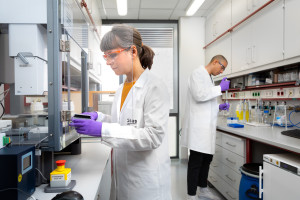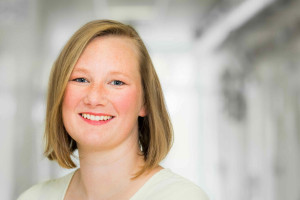-
The institute’s graduate programmes includes structured training for doctoral candidates and further training offers for postdocs and junior executives in science. With regard to the training for junior researchers, the institute takes part in a regular exchange of ideas and information with the universities and colleges with which it cooperates in research and teaching
-
ISAS cooperates with TU Dortmund University, Ruhr University Bochum, the University of Duisburg-Essen and Bielefeld University.
Graduate Programmes

-
Doctoral candidates
-
The objective of the structured training for doctoral candidates is to introduce PhD students to interdisciplinary work as defined in ISAS’s research concept. The focus is consequently on imparting basic knowledge on the range of analytical methods and how they can be deployed for the use in health research as well as data evaluation and an intense specialist exchange between researchers from differing disciplines. From the outset, ISAS provides support for researchers’ work on their own publications, facilitates their participation in international scientific conferences and promotes international visits and exchange programmes.
Over the first three years of the PhD phase, the curriculum of the structured training for doctoral candidates covers nine workshops on soft skills – such as good scientific practice, scientific writing, English for science, presentation techniques or patent law – and an annual summer school; an information event on career planning; an internal »lab rotation« and an optional PhD-related stay at a research institution in another country. The professional development and training programmes mainly take place in blocks to cause as little disruption as possible to the actual research work. In the final stage, the focus shifts to completing the research and the dissertation. How long a PhD takes at ISAS depends on the specialisation and averages between three and a half and four and a half years.
Postdocs
After completing their PhD, researchers at ISAS have the option of obtaining further qualifications through an extensive range of training offerings. This includes, for example, events on German and European research funding, on project management or intercultural cooperation.
At the institute, great importance is attached to commencing independent scientific work at the earliest possible stage. With the Early Independence programme and the Postdoc Pitch Day event, ISAS offers researchers the opportunity to independently put their project ideas into practice shortly after completing their PhD. At the same time the junior researchers receive mentoring and support in their search for funding.

-
Junior researcher groups
-
ISAS provides support for the career opportunities for excellent junior researchers by allowing them to head research groups. Being given responsibility in an executive capacity as early as possible is intended to support those researchers who aspire to an ongoing professional career in research.
The junior executives are integrated into a binding further training programme to obtain management skills and to provide an opportunity for discussion and feedback also outside of the institute’s organisational structure.
Contact
